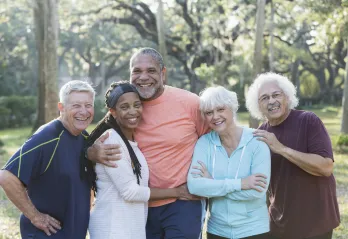Health Tips for Aging Adults

As a leading nonprofit dedicated to improving the nation’s health, YMCA of Greensboro offers the following tips to encourage older adults in the triad area to live healthier lives.
1. Have fun with your food. Eating healthy doesn’t have to be boring! Have fun with your fruits and vegetables by trying them fresh or frozen. Find a new recipe that uses a different source of protein or find a way to incorporate fish or beans into an old favorite. Remember as you age, it’s important to eat a variety of fruits, vegetables, whole grains, low-fat or fat-free dairy, and lean meats to help your body get the necessary nutrients.
2. Fill up on fiber and potassium, hold the salt. As you age, your body needs more fiber-rich foods to help it stay regular. Aim for a variety of colorful foods on your plate (i.e. fruits and veggies) to keep fiber-rich foods a part of your diet. Additionally, increasing potassium along with reducing sodium or salt may lower your risk of high blood pressure. Fruits, vegetables and low-fat or fat-free milk and yogurt are good sources of potassium.
3. Get Active. Physical activity is safe for almost everyone, and the health benefits far outweigh the risks. Regular physical activity is one of the most important things older adults can do for their health. It can prevent many of the health problems that seem to come with age (such as osteoporosis and arthritis) and reduce the risk for developing, or help manage, depression, diabetes, heart disease, stroke and certain kinds of cancers. For older adults who have chronic conditions that hinder their ability to be active on a regular basis, some physical activity is better than none, and older adults who participate in any amount of physical activity gain some health benefits.
4. Tweak your routine. To get the recommended 30 minutes of daily physical activity, change your routine to 10-minute sessions throughout the day. For example, stand on one foot while brushing your teeth to increase balance, and do squats while washing dishes to increase strength. Make sure you can grab hold of something to maintain balance—safety first! To increase your cardio, take the stairs instead of the elevator or park farther from the entrance to work. When sitting in front of the TV, march during commercials or do some light stretching to break up sitting for long periods.
5. Get social. Socialization is an important part of aging. As we get older, it’s important to be active socially to stay healthy. Take a walk with a friend or a neighbor, join a book club or volunteer at your local pet shelter or local Y. Social interaction provides meaningful engagement, builds relationships, enhances a sense of belonging and provides opportunities for involvement—all resulting in greater bonds and a stronger sense of community. Being connected to the community keeps you healthy!
For more information on how your family can live a healthy, active life, stop by one of our area branches today!